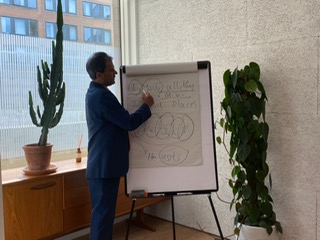RSPH Level 2 Award in Infection Prevention and Control for Special Procedures Practitioners July 2019
Guided Learning Hours 7 Total Qualification Time 8
QiW: C00/3873/0
Ofqual: 603/4597/4
Description
The objective of the RSPH Level 2 Award in Infection Prevention and Control for Special Procedures Practitioners is to cover the principles of infection control through application of the ‘chain of infection’ and the ‘standard infection control precautions’ for Special Procedures Practitioners either employed, self-employed or as practitioners managing a business. It is a valuable free standing qualification that is also suitable for trainee practitioners engaged in other relevant vocational training and employment.
The purpose of this qualification is for learners to obtain a knowledge and understanding of; the importance of infection control and prevention, associated infectious and non-infectious hazards, good infection practice and controls based upon an awareness of the chain of infection and standard infection control precautions.
Special Procedures Practitioners are individuals who practice acupuncture, body piercing, electrolysis or tattooing. In Wales these are as identified in Section 57 of the Public Health (Wales) Act 2017 and are further defined in Section 94 of that Act. In England these are identified under Section VIII of the Local Government (Miscellaneous Provisions) Act 1982 as amended by the Local Government Act 2003 and in Northern Ireland by The Local Government (Miscellaneous Provisions) (Northern Ireland) Order 1985 and The Local Government (Northern Ireland) Order 2005.
‘Acupuncture’ refers to the insertion of needles into an individual’s tissue for remedial or therapeutic purposes, but excludes the insertion of needles into tissue for the purpose of injecting substances.
‘Body piercing’ refers to the perforation of an individual’s skin or mucous membrane, with the view to enabling (a) jewellery, or (b) an object of a description prescribed in or under regulations, to be attached to, implanted in, or removed from the individual’s body.
‘Electrolysis’ refers to the removal of an individual’s body hairs by passing an electric current through the root by means of an inserted needle to probe. ‘Tattooing’ refers to the insertion of any colouring material designed to leave a semi-permanent or permanent mark (including micro pigmentation) into punctures made in an individual’s skin or mucous membrane
The objective of the RSPH Level 2 Award in Infection Prevention and Control is to cover the principles of infection control through application of the ‘chain of infection’ and the ‘standard infection control precautions’.
The purpose of this qualification is for learners to obtain a knowledge and understanding of; the importance of infection control and prevention, associated infectious and non-infectious hazards, good infection practice and controls based upon an awareness of the chain of infection and standard infection control precautions.
Who is it for?
This qualification is for Special Procedures Practitioners either employed, self-employed or as practitioners managing a business. It is a valuable free standing qualification that is also suitable for apprentices and trainee practitioners engaged in other relevant vocational training and employment.



